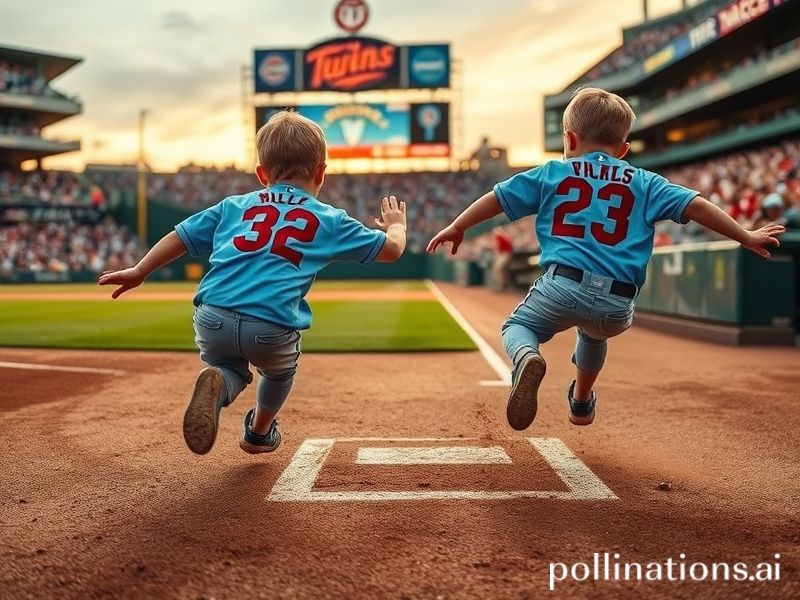Twins Game: How the World Learned to Be in Two Places at Once (and Charge Admission)
Twins Game: The Global Spectacle of One Body Politic in Two Places at Once
By Dave’s Locker International Correspondent
Somewhere between the DMZ and a Danish design fair, humanity has discovered the perfect cheat code for being in two places simultaneously: call it the Twins Game. No longer the quaint curiosity of Minnesota baseball fans or the logistical headache of Lagos traffic cops, twinning—literal, political, and algorithmic—has become the planet’s favorite workaround for a calendar that refuses to add extra days.
Start with the obvious: biological twins. In Cândido Godói, Brazil, the local maternity ward resembles a buy-one-get-one-free promotion run amok—nearly one in ten births is a double feature. Scientists blame in-breeding, pesticides, or sheer statistical boredom; locals prefer the Nazi-doctor-in-exile legend because, frankly, “genetic drift” doesn’t sell keychains. The town’s economy now runs on souvenir onesies and conspiracy tours, proving once again that capitalism can monetize anything, even ova that refuse to travel solo.
Slide the lens westward to Washington, where the Twins Game is less chromosomal and more constitutional. The American president signs climate accords in Brussels while a body-double—rumor says a former Chippendale with dental work paid for by a defense contractor—cuts ribbons in Ohio. The trick isn’t new; Stalin had doppelgängers, Saddam had doubles, Hollywood has CGI. What’s fresh is the global audience’s blasé shrug: we’ve accepted that leadership itself can be franchised like Starbucks. One venti executive order, two locations, extra foam.
Meanwhile, in the digital realm, the Twins Game has gone fully post-human. Chinese livestreamers deploy AI clones to flirt with fans at 3 a.m. local time, racking up tips in yuan while their flesh-and-blood originals sleep off a hotpot coma. EU regulators draft “right to your own face” legislation; Silicon Valley simply updates the terms of service and calls it “enhanced productivity.” Somewhere, a Kazakh teenager is earning rent money by renting out his facial geometry to a Brazilian cosmetics bot. The supply chain of selfhood now comes with barcodes.
Even diplomacy has joined the act. During last month’s COP summit in Dubai, island nations sent twin delegations: one physical team to occupy chairs, one holographic set to haunt side-events and guilt major emitters. The stunt worked—sort of. Germany pledged another €50 million in climate adaptation funds, promptly denominated in carbon credits that will mature sometime after the Maldives are underwater. Effectiveness is beside the point; optics are everything, and optics now come in stereo.
The darker twin, of course, is the military version. Ukraine’s frontline drones are flown by hobbyists in Nevada; Russia’s propaganda avatars spar with them on Telegram from a server farm in Yekaterinburg. Each side accuses the other of “ghost presence,” a phrase that used to be theological but now fits neatly in a PowerPoint slide. The International Red Cross is drafting rules on “dual-use twins,” which sounds like a euphemism for your ex’s wedding party.
Economically, the implications are deliciously perverse. If one human can bilocate—or trilocate—labor markets convulse. A Filipino nurse can simultaneously monitor ICU feeds in Toronto, Riyadh, and Sydney, clocking triple overtime while eating adobo in Manila. Economists call it “productivity arbitrage”; exhausted humans call it Tuesday. The World Bank, ever helpful, projects a 2.3 percent bump in global GDP by 2030, neatly offsetting the 2.3 percent rise in burnout prescriptions.
And yet, for all the gee-whiz dystopia, the Twins Game reveals a stubborn truth: we still crave the original. When Beyoncé’s AI twin malfunctioned mid-concert in Stockholm, fans booed the uncanny valley right out of the arena. Authenticity, it turns out, is the final luxury good—available in strictly limited edition, no returns.
So the planet keeps cloning, outsourcing, and hologramming itself into a state of perpetual déjà vu. We are everywhere and nowhere, like Schrödinger’s passport. The Twins Game is winning; the only remaining question is whether humanity will still recognize its own reflection when the house lights come up. Spoiler: the mirror is also rented, and the deposit is non-refundable.







